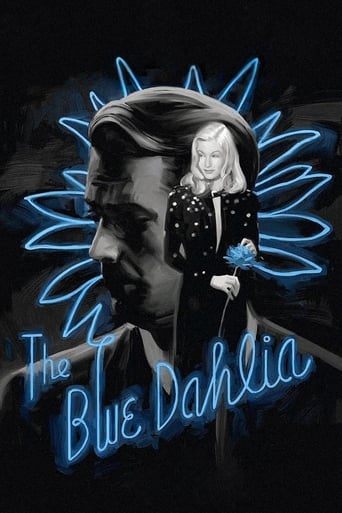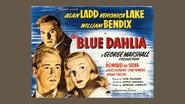JohnHowardReid
Finally, the contractee's voice was heard by studio management. Given the go-ahead for an original suspense thriller, Raymond Chandler set to work on "The Blue Dahlia" (1946). In many ways vintage Chandler, with lots of atmospheric touches, cynical dialogue, a fabulous femme fatale (Doris Dowling) and an embittered hero (played with an appropriate lack of emotion by Alan Ladd), the completed script hit an unexpected snag. The Navy Department complained to the studio that portraying neurotic veterans as potential killers violated the senior service's no-no code. A compromise was reached, forcing Chandler to re-work the ending of the movie. That he did so under protest is evident by the slip-shod, utterly unconvincing way he "remedied" the situation. In fact, when he revised his last word on Blue Dahlia, he tore up his contract, vowing never to work in Hollywood again. (Available on a 10/10 Universal DVD).
Leofwine_draca
THE BLUE DAHLIA is a standard film noir flick from the 1940s, with an above average script by Raymond Chandler which emphasises characterisation more than you'd aspect from this genre. The film is probably better known to history for inspiring the name of a real life murder case (that of the Black Dahlia) which followed shortly after the movie's release.Alan Ladd gives a solid performance as a soldier who returns from the war with some buddies to discover that his home life is very different to how he left it. Pretty soon his scheming wife is found murdered, and naturally the finger of suspicion falls on Ladd. This set-up is entirely routine, but there's enough interaction with gangsters and pursuing cops, not to mention Veronica Lake's femme fatale, to make it workable.One of the film's biggest strengths comes from William Bendix who plays one of Ladd's army buddies. Bendix has shrapnel lodged in his head which gives him some bizarre side effects and these are dealt with very effectively. It's the best performance I've seen Bendix give. Otherwise, the only thing that spoils this is the very ordinary ending, a re-write forced on Chandler by the studio. The original ending would have been much more effective.
khdustbin
I've watched this movie over a few times recently, not because it's a flawless noir masterpiece—it isn't—but to enjoy the characterization, the period feel and that unique Chandler dialogue. The parts add up to much more than the whole, I'd say. In discussing some key moments below, I will avoid giving away any plot details or the ending.A word in defence of Doris Dowling (as Helen). There's lots of compassion for Buzz, whose war injury and experiences cause him to act erratically, but poor Helen gets little sympathy for her own trauma. We presume a good egg like Johnny wouldn't have married her if she'd been a bad sort, but she's accidentally caused the death of her little boy through negligence by driving while drunk (his photo is evidently Alan Ladd as a child). Unable to live with the crushing guilt, and with her husband the other side of the world, she's crawled into a bottle, something Chandler could write so well from experience. She spends her time tipsy, a lush surrounding herself with good-timers and having casual affairs to drown out the memory, just to get through the days. Then war-hero Johnny suddenly turns up and she's confronted with the man whose son she's killed. That dreadful guilt resurfaces and, bitter and self-loathing, she blurts out the whole sorry tale, baiting Johnny so she can make him hurt as she does (and probably to evoke enough hatred in him to make him mete out the punishment she deep-down feels she deserves). It works almost too well, though, as he pulls a gun on her—but, moments later, regaining his self-control, he walks out, deciding she isn't worth it. Later, regretful, she unsuccessfully tries to contact him, then takes off for the hotel bar.I feel it's unfair to criticize as 'hammy' or over-dramatic Dowling's acting in the bungalow scenes—it was George Marshall's job to get it just the way he wanted it and, whether laughing hysterically, wincing, or tugging absent-mindedly on the phone wire, Doris must have been closely following his directions.She seems nicely at home once at the bar, where some of my favourite moments take place. Buzz (in a coincidence too far, to be honest) wanders in as he waits to meet Helen then, almost by accident, picks her up, unaware she's the very woman he's waiting to see. For two solid minutes, she is cool, appealing, beautiful, and they share some cute mutual wisecracking. She and Buzz head off to her bungalow so he can make a call. When he hesitates momentarily, she stands in the pouring rain in her slinky outfit and looks back at him, taunting him playfully: "What's the matter? Scared?" She flashes a winsome smile and turns on her heel, an invitation no red-blooded male could resist (just as I couldn't resist that period term, sorry!) Unfortunately, Veronica Lake never gets quite such a seductive moment in this film. Anyone who knows Chandler's bio will appreciate why he will have identified far more closely with Helen's character than with any other in the drama.A typically underplayed Chandler one-liner crops up when Eddie learns from concerned business partner Leo that his beloved ex, Joyce (Lake), has left a message saying she's quit town 'to save money on flowers' as obviously, she was receiving too many of Eddie's signature blue dahlias…Eddie (morosely): "She could have told me that herself." Leo: "Maybe she figured it would sound worse, coming from me."And Buzz's interplay down at the station house with the old cop is priceless, too.An imperfect film written by an imperfect man, sure, but with enough fine moments to satisfy any Chandler aficionado.
MisterWhiplash
I have to wonder if Raymond Chandler really had a passion for this project - perhaps he did, it was the only original screenplay he wrote, by himself, in the years he wrote for Hollywood features - or if it was just a project to quickly dash off to make some cash. It's not that he doesn't put his all in it as far as his dialog goes, which, if you watch films like Double Indemnity (albeit with Wilder and adapting Cain) or The Big Sleep (which really does retain a lot of his dialog if not all the plot), this does have the same cadences and cynical, witty banter with characters. It's a hardcore pulp noir involving a man who is wrongfully accused of killing his wife after coming home from the war - part of the motive may be, people suspect, that he was despondent over her drunk-driving killing their child - though we know he didn't do it as he has an alibi that sticks.What makes me question it is that, you know, we've seen this sort of thing before with the man wrongfully accused - hell, it was Hitchcock's stock and trade for many years. What also seems kind of confused and, though well-intentioned, dated, is the depiction of shell-shock (or PTSD for the modern crowd) with the character of Buzz (William Bendix). This is a fascinating supporting character in the way that he has no other real purpose in the film - albeit he does work himself into the plot by a certain point, to be sure - except as a kind of irritated Id, a man who freaks out whenever he hears music due to the metal plate in his head from the war. There's not a shred of depth to him, and yet he's both an inspired creation and something that feels totally dead-weight, a one-dimensional being, doing the same thing scene after scene like a big lummox of a child.But maybe it's some of the other characters that feel stock... no, they're finely drawn enough, those criminals and gangsters that take up the space in the office of the Blue Dahlia night-club, or some of the others that tail Alan Ladd's character. Maybe it's Ladd himself and how he's directed that doesn't quite work, as he is just kind of a bland presence here - more in appearance perhaps than his voice - and Lake is similar, though she brings a little more emotion to it in scene to scene reacting to things and being the not-really-femme-fatale of the story (no, that would maybe be more-so the wife). Not that Doris Dowling does better when it comes time for her to emote about the Tragedy of Little Dickie.I criticize all this mainly because it should have been tremendous stuff, and... it's not. But director George Marshall, under John Houseman's production, and featuring an awesome supporting turn for Howard DaSilva as Eddie Harwood (if that indeed is his name!) there's enough here that works and makes for a very fun viewing. Sometimes just letting the actors take the entertaining aspects of Chandler's text - which also includes some bloody fight scenes with Ladd and some baddies in the third act - is enough to make me keep watching. It's still a cinematic world fused into film noir, and LA noir at that; the third act set at the house in the dark is moody in just the right atmosphere. And though everything gets wrapped up a little too quick - seriously, it made the audience I was with laugh out loud so to speak - the plot is fairly air-tight for what Chandler is working with, which involves the procedural stuff, false flags, and revelations that ultimately are about showing the two leads together in fine style.Actually, for Ladd and Lake, there is one very good scene here, where the two are in the car at night and trying to come up with the name from the initials J.M. A scene like that, somehow, the actors come off more relaxed, get into the script fully, and the direction is nice too. Maybe a little more of that and less formula. But, again, it's still good, really good, and a cut above other film noirs just by Chandler being a natural g-damn writer for men in coats with guns and dames with ulterior motives (and big lunk-heads who may or may not know any better)




